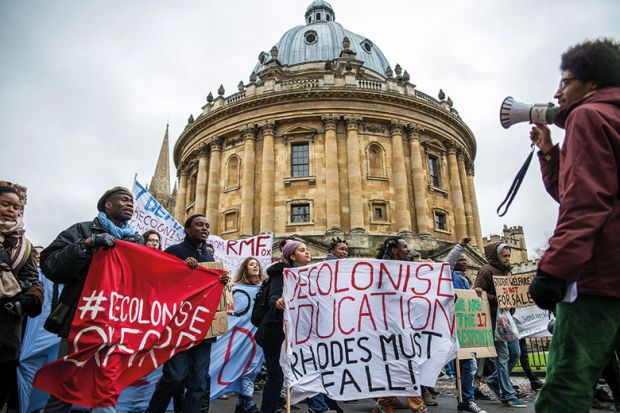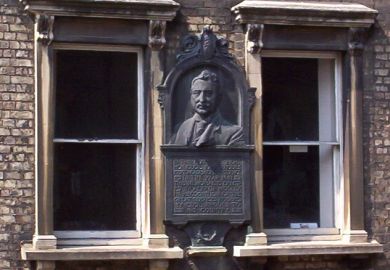Is the Rhodes Must Fall campaign at the University of Oxford an example of “Maoist moralizing” or part of an essential effort to get “complacent” universities to acknowledge their tainted histories?
Both views were expressed at a conference held at the University of London’s Institute of Historical Research last year. Most of the papers have now been adapted for publication by the IHR as Dethroning Historical Reputations: Universities, Museums and the Commemoration of Benefactors, edited by Jill Pellew and Lawrence Goldman.
In organising such an event, said Professor Goldman, who holds a post at the IHR, “you invite people who have skin in the game, who are involved in these kinds of questions because they are museum directors or running a big project on the history of slavery or because they fundraise for Cambridge University”.
He added: “I sometimes think in a debate like this that the polemical positions people take are based upon a lack of context. My contribution is to say that we have had to deal with these problems before.”
Contributors to the book explore the history of endowments, the role of moral judgements in history, the “Randlords” (who controlled the early diamond and gold mine industries in South Africa) as benefactors to what became part of Imperial College London and the complex balancing acts required of fundraisers.
Victoria Harrison, former chief executive of the Wolfson Foundation, a grant-awarding charity, offers a “funder’s perspective” in the book. She describes the university fundraising “brochures with shopping-lists and prices attached” (“£1 million for a named lecture room, £500,000 for an entrance hall [and so on], though lavatories do not seem to be on offer”). She also recalls her “husband wryly observ[ing] on one social occasion that I had been kissed by seventeen vice-chancellors – though one knows all too well that from retirement day their flow of Christmas cards shrinks and their kisses cease”.
Others intervene more forcefully in the Rhodes Must Fall and related debates.
Brian Young, university lecturer in history at Oxford, describes the campaign as an “outbreak of moralizing Maoism” and points to the danger of the “Whig Interpretation of History” being replaced by the “Prig Interpretation of History”.
Tiffany Jenkins, an honorary fellow in law at the London School of Economics, argues that pulling down statues or repatriating objects such as the brass Benin cockerel owned by Jesus College, Cambridge “does little to advance material and political equality”, and that “statues and museum objects are expected to do more work than they can achieve, turning the latter into objects of apology where they were once objects of enlightenment”.
It is dangerous when “people are presented, and asked to perceive themselves, as defined only by what heinous things were done to their ancestors”, and for other people to be “held culpable for the past – not because of their own actions, but because of the particular national, religious, ethnic, or racial group to which they belong”, she argues. Nor were the objects themselves necessarily “innocent”: both the Parthenon sculptures and the Benin bronzes were products of slave-owning societies, she adds.
A very different position is taken by Nicholas Draper, director of the Centre for the Study of the Legacies of British Slave-Ownership at UCL. Pointing out that the IHR conference featured “academic historians, heritage professionals and university administrators” but no activists, he reports “mounting anger over the ways that universities – and not only universities – are failing to deal with their histories of entanglement with British colonial slavery”.
This anger, he says, “flows from the continued complacent and uncritical representation and celebration of [an] often cruel and violent past as progressive, liberal, enlightened”. The chapter goes on to survey the evidence for universities themselves, their founders and benefactors, even their faculty and students, as being slave owners. Equally significant were “the most problematic intellectual legacies of slavery, including the invention of ‘race’, so central a legacy at University College London through the work of [eugenicist Francis] Galton”.
Although Professor Goldman told Times Higher Education that he did not believe that “history can be made instrumental” or provide simple answers to today’s controversies, his chapter in Dethroning Historical Reputations mentions options such as relegating the statue of Cecil Rhodes at Oriel College, Oxford to a “sculpture park for the outmoded and unadmired”, such as can be found in Delhi and Moscow, or “balancing” existing monuments with new ones devoted to people “we now respect and admire”.
Another possible model for reconciling past and present perspectives is the Oxford Dictionary of National Biography, which has recently incorporated much information about slaveholders from Dr Draper’s research.
“The decision was not to tear up the old version of the dictionary and simply start afresh,” explained Professor Goldman, “but to accept the Victorian view of British history and revise the earlier articles, working with what you’ve got and using that as a basis for going forward.”
POSTSCRIPT:
Print headline: Putting Rhodes and his ilk in the round
Register to continue
Why register?
- Registration is free and only takes a moment
- Once registered, you can read 3 articles a month
- Sign up for our newsletter
Subscribe
Or subscribe for unlimited access to:
- Unlimited access to news, views, insights & reviews
- Digital editions
- Digital access to THE’s university and college rankings analysis
Already registered or a current subscriber?







